人教版 高中 英语 必修3 Unit 1 reading 课文详解
人教版必修3课文讲解Unit1
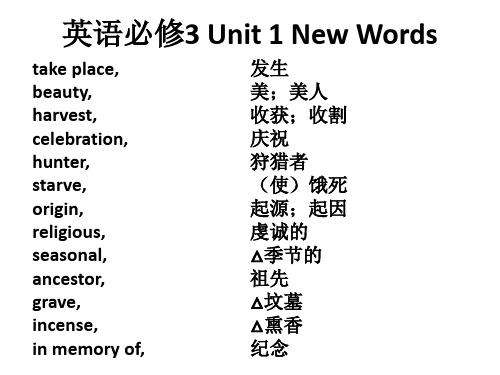
day and night, clothing Christian cherry, blossom, as though, have fun with, custom, worldwide, fool, necessity, permission, prediction, 昼夜 衣服 基督徒 △樱桃 △花;开花 好像 玩得开心 习惯;风俗 世界性的 愚人;傻的 △必要性 许可 △预言;预告
independent, gather, agriculture, agricultural, award, produce, rooster, admire, energetic, look forward to, lunar, Easter, parade,
英语必修3 Unit 1 New Words
英语必修3 Unit 1 New Words
take place, beauty, harvest, celebration, hunter, starve, origin, religious, seasonal, ancestor, grave, incense, in memory of, 发生 美;美人 收获;收割 庆祝 狩猎者 (使)饿死 起源;起因 虔诚的 △季节的 祖先 △坟墓 △熏香 纪念
英语必修3 Unit 1课文 讲解
Festivals of the dead Some festivals are held to honour the dead or to satisfy the ancestors, who might return either to help or to do harm. For the Japanese festival Obon, people should go to clean graves and light incense in memory of their ancestors. They also light lamps and play music because they think that will lead the ancestors back to earth. In Mexico, people celebrate the Day of the Dead in early November. On this important feast day, people eat food in the shape of skulls and cakes with “bones” on them. They offer food, flowers and gifts to the dead. The Western holiday Halloween also had its origin in old beliefs about the return of the spirits of dead people. It is now a children’s festival, when they can dress up and go to their neighbours’ homes to ask for sweets. If the neighbours do not give any sweets, the children might play a trick on them.
2019新人教版高二英语选择性必修三Unit 1课文及翻译
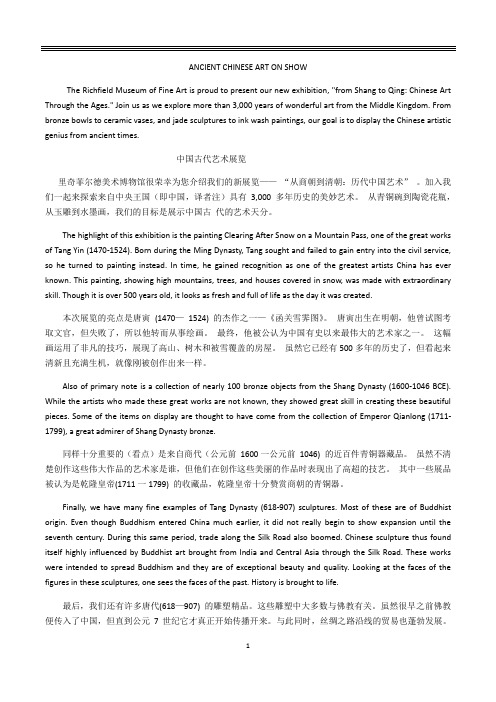
ANCIENT CHINESE ART ON SHOWThe Richfield Museum of Fine Art is proud to present our new exhibition, "from Shang to Qing: Chinese Art Through the Ages." Join us as we explore more than 3,000 years of wonderful art from the Middle Kingdom. From bronze bowls to ceramic vases, and jade sculptures to ink wash paintings, our goal is to display the Chinese artistic genius from ancient times.中国古代艺术展览里奇菲尔德美术博物馆很荣幸为您介绍我们的新展览——“从商朝到清朝:历代中国艺术”。
加入我们一起来探索来自中央王国(即中国,译者注)具有3,000 多年历史的美妙艺术。
从青铜碗到陶瓷花瓶,从玉雕到水墨画,我们的目标是展示中国古代的艺术天分。
The highlight of this exhibition is the painting Clearing After Snow on a Mountain Pass, one of the great works of Tang Yin (1470-1524). Born during the Ming Dynasty, Tang sought and failed to gain entry into the civil service, so he turned to painting instead. In time, he gained recognition as one of the greatest artists China has ever known. This painting, showing high mountains, trees, and houses covered in snow, was made with extraordinary skill. Though it is over 500 years old, it looks as fresh and full of life as the day it was created.本次展览的亮点是唐寅(1470—1524) 的杰作之一—《函关雪霁图》。
人教版英语必修三Unit1Reading课件

Obon (盂兰盆) in Japan
Columbus Day
P 4. Harvest Festivals Harvest and Thanksgiving Festival Mid-Autumn festival
P 5. Spring Festivals Spring festival Carnival Easter Cheery Blossom Festival
Festivals Activities
Obon
The Day Halloween
of the Dead
Cleaning Eating
Children
_g_r_a_v_e_s; cakes with _d_r_es_s__u_p
lighting _b_o_n__e_s on _i_n_c_en__se_ them; and lamps; offering
Reading
FESTIVALS AND CELEBRATIONS
Skimming
What festivals are mentioned in each paragraph P1. Ancient festivals celebrate the end of the cold weather, planting in spring and harvest in autumn; celebrate when hunters catch animals.
New words
starve: 饥饿 origin: 起源 ancestor: 祖先 Obon: 盂兰盆节(日本) grave: 坟墓; 墓地 incense: 熏香 in memory of: 纪念 feast: 节日; 盛宴
skull: 头骨 dress up: 打扮; 盛装 play a trick on: 搞恶作剧 award: 奖品 rooster: 公鸡 energetic: 充满活力的 carnival: 狂欢节 parade: 游行
人教版高中英语必修三unit1Reading
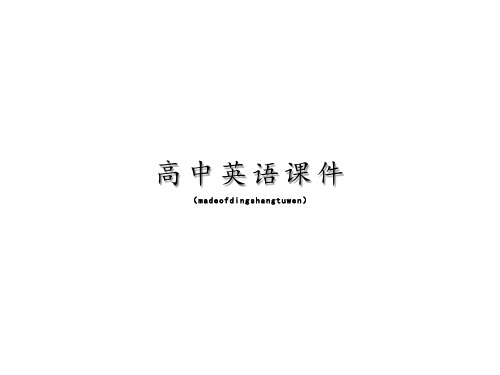
2)Whatmakesautumnfestivalshappyevent s?
Autumnfestivalsarehappyeventsbecausep eoplearethankfulthatfoodisreadyforwi nterandthehardfarmworkisfinished.
3)Whatdopeopleusuallydoatspringfestivals? Atspringfestivals,peopleusuallyhavedances,
Children’sDay
Teachers’Day DragonBoMother’sDay at Festival
Whendotheytakeplace?
SpringFestival January1
atlunarcalendar
LanternFestival January15
atlunarcalendar
Memory
Singing
WatchingTV Dancing
Sample:
SpringFestival Wecelebratetheendofwinter,arrivalofsprin g,LunarNewYear,reunionwithfamilyandrel atives.DuringSpringFestival,peoplegivemo neyinredpapertochildren;seedragondances ;eatfish,prawnsanddumplings;visitfamily member.
高中英语课件
(madeofdingshangtuwen)
人教课标 高一必修3
Unit1
Whatfestivalsdoyouknow?
2019新人教版高中英语选择性必修三unit1课文及翻译(英汉对照)
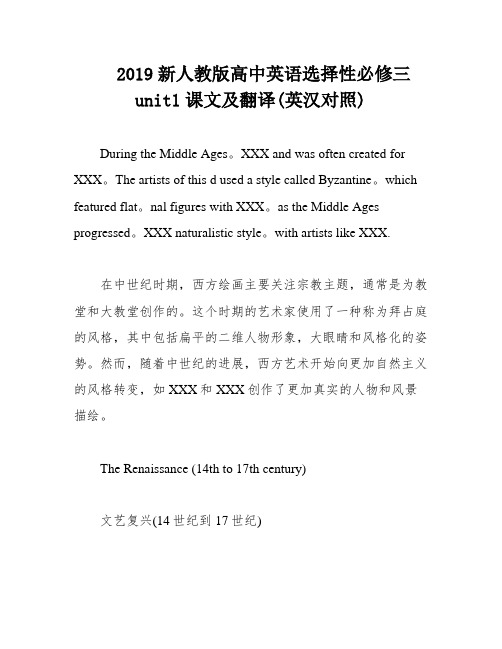
2019新人教版高中英语选择性必修三unit1课文及翻译(英汉对照)During the Middle Ages。
XXX and was often created for XXX。
The artists of this d used a style called Byzantine。
which featured flat。
nal figures with XXX。
as the Middle Ages progressed。
XXX naturalistic style。
with artists like XXX.在中世纪时期,西方绘画主要关注宗教主题,通常是为教堂和大教堂创作的。
这个时期的艺术家使用了一种称为拜占庭的风格,其中包括扁平的二维人物形象,大眼睛和风格化的姿势。
然而,随着中世纪的进展,西方艺术开始向更加自然主义的风格转变,如XXX和XXX创作了更加真实的人物和风景描绘。
The Renaissance (14th to 17th century)文艺复兴(14世纪到17世纪)The Renaissance was a d of great artistic and cultural changein Western Europe。
During this time。
XXX。
XXX。
Some ofthe most famous artists of the Renaissance include Leonardo da Vinci。
Michelangelo。
and Raphael。
These artists created works that were characterized by their n to detail。
use of perspective。
and realistic ns of the human form.文艺复兴是西欧一个伟大的艺术和文化变革时期。
在这个时期,艺术家开始探索新的技术和风格,导致对古典艺术和文化的重新关注。
人教版高中英语必修3课文翻译
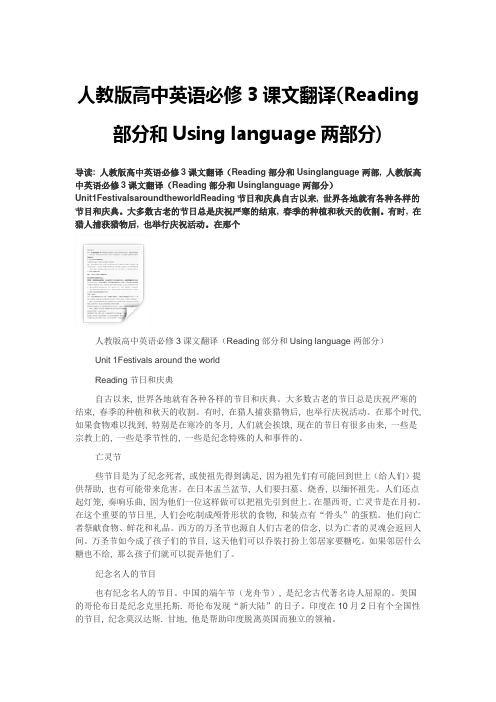
人教版高中英语必修3课文翻译(Reading 部分和Using language两部分)导读: 人教版高中英语必修3课文翻译(Reading部分和Usinglanguage两部, 人教版高中英语必修3课文翻译(Reading部分和Usinglanguage两部分)Unit1FestivalsaroundtheworldReading节日和庆典自古以来, 世界各地就有各种各样的节目和庆典。
大多数古老的节日总是庆祝严寒的结束, 春季的种植和秋天的收割。
有时, 在猎人捕获猎物后, 也举行庆祝活动。
在那个人教版高中英语必修3课文翻译(Reading部分和Using language两部分)Unit 1Festivals around the worldReading节日和庆典自古以来, 世界各地就有各种各样的节目和庆典。
大多数古老的节日总是庆祝严寒的结束, 春季的种植和秋天的收割。
有时, 在猎人捕获猎物后, 也举行庆祝活动。
在那个时代, 如果食物难以找到, 特别是在寒冷的冬月, 人们就会挨饿, 现在的节日有很多由来, 一些是宗教上的, 一些是季节性的, 一些是纪念特殊的人和事件的。
亡灵节些节目是为了纪念死者, 或使祖先得到满足, 因为祖先们有可能回到世上(给人们)提供帮助, 也有可能带来危害。
在日本盂兰盆节, 人们要扫墓、烧香, 以缅怀祖先。
人们还点起灯笼, 奏响乐曲, 因为他们一位这样做可以把祖先引到世上。
在墨西哥, 亡灵节是在月初。
在这个重要的节日里, 人们会吃制成颅骨形状的食物, 和装点有“骨头”的蛋糕。
他们向亡者祭献食物、鲜花和礼品。
西方的万圣节也源自人们古老的信念, 以为亡者的灵魂会返回人间。
万圣节如今成了孩子们的节目, 这天他们可以乔装打扮上邻居家要糖吃。
如果邻居什么糖也不给, 那么孩子们就可以捉弄他们了。
纪念名人的节目也有纪念名人的节目。
中国的端午节(龙舟节), 是纪念古代著名诗人屈原的。
人教版 高中 英语 必修3 Unit 1 reading 课文详解
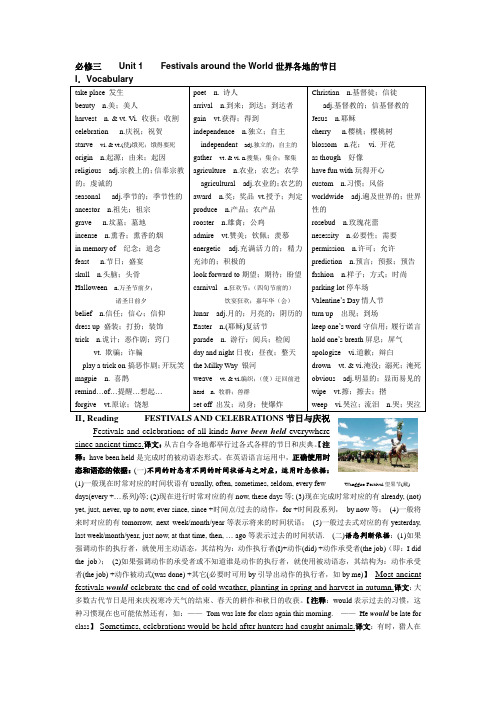
必修三Unit 1 Festivals around the World世界各地的节日take place 发生beauty n.美;美人harvest n. & vt. Vi. 收获;收割celebration n.庆祝;祝贺starve vi. & vt.(使)饿死;饿得要死origin n.起源;由来;起因religious adj.宗教上的;信奉宗教的;虔诚的seasonal adj.季节的;季节性的ancestor n.祖先;祖宗grave n.坟墓;墓地incense n.熏香;熏香的烟in memory of 纪念;追念feast n.节日;盛宴skull n.头脑;头骨Halloween n.万圣节前夕;诸圣日前夕belief n.信任;信心;信仰dress up 盛装;打扮;装饰trick n.诡计;恶作剧;窍门vt. 欺骗;诈骗play a trick on搞恶作剧;开玩笑magpie n. 喜鹊remind…of…提醒…想起…forgive vt.原谅;饶恕poet n. 诗人arrival n.到来;到达;到达者gain vt.获得;得到independence n.独立;自主independent adj.独立的;自主的gather vt. & vi. n.搜集;集合;聚集agriculture n.农业;农艺;农学agricultural adj.农业的;农艺的award n.奖;奖品vt.授予;判定produce n.产品;农产品rooster n.雄禽;公鸡admire vt.赞美;钦佩;羡慕energetic adj.充满活力的;精力充沛的;积极的look forward to期望;期待;盼望carnival n.狂欢节;(四旬节前的)饮宴狂欢;嘉年华(会)lunar adj.月的;月亮的;阴历的Easter n.(耶稣)复活节parade n. 游行;阅兵;检阅day and night日夜;昼夜;整天the Milky Way 银河weave vt. & vi.编织;(使)迂回前进herd n. 牧群;兽群set off 出发;动身;使爆炸Christian n.基督徒;信徒adj.基督教的;信基督教的Jesus n.耶稣cherry n.樱桃;樱桃树blossom n.花;vi. 开花as though 好像have fun with玩得开心custom n.习惯;风俗worldwide adj.遍及世界的;世界性的rosebud n.玫瑰花蕾nesessity n.必要性;需要permission n.许可;允许prediction n.预言;预报;预告fashion n.样子;方式;时尚parking lot停车场Valentine’s Day情人节turn up 出现;到场keep one’s word守信用;履行诺言hold one’s breath屏息;屏气apologize vi.道歉;辩白drown vt. & vi.淹没;溺死;淹死obvious adj.明显的;显而易见的wipe vt.擦;擦去;揩weep vi.哭泣;流泪n.哭;哭泣II.Reading FESTIV ALS AND CELEBRATIONS节日与庆祝Festivals and celebrations of all kinds have been held everywheresince ancient times.译文:从古自今各地都举行过各式各样的节日和庆典。
高一资料98:必修三 Unit1 Reading and Thinking 课文要点精析
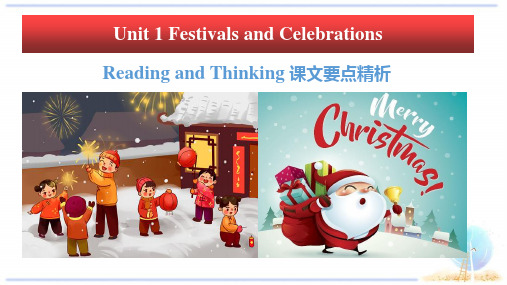
Part II 课文知识点详解
★figure n.人物;数字;身材;画像;雕像vt.认为;认定;计算;描 绘 [例句] (写出下列句中figure的含义) ①Can you read this figure? Is it a three or an eight?数字 ②The medical scientist, is a leading figure in the battles against SARS in 2003 and COVID-19 in 2020.人物 ③This is the figure of Lu Xun, painted by himself.画像 ④They figured it was better to stay where they were.认为
3. Analyze and judge the reasons for the disappearance of some customs and the emergence of new customs and express their views rationally.
4. Evaluate the author's views and attitudes towards the commercialization of festivals.
2. Describe and explain the commonalities of harvest festivals and the similarities and differences between ancient and modern Chinese and foreign harvest festivals.
- 1、下载文档前请自行甄别文档内容的完整性,平台不提供额外的编辑、内容补充、找答案等附加服务。
- 2、"仅部分预览"的文档,不可在线预览部分如存在完整性等问题,可反馈申请退款(可完整预览的文档不适用该条件!)。
- 3、如文档侵犯您的权益,请联系客服反馈,我们会尽快为您处理(人工客服工作时间:9:00-18:30)。
必修三Unit 1 Festivals around the World世界各地的节日take place 发生beauty n.美;美人harvest n. & vt. Vi. 收获;收割celebration n.庆祝;祝贺starve vi. & vt.(使)饿死;饿得要死origin n.起源;由来;起因religious adj.宗教上的;信奉宗教的;虔诚的seasonal adj.季节的;季节性的ancestor n.祖先;祖宗grave n.坟墓;墓地incense n.熏香;熏香的烟in memory of 纪念;追念feast n.节日;盛宴skull n.头脑;头骨Halloween n.万圣节前夕;诸圣日前夕belief n.信任;信心;信仰dress up 盛装;打扮;装饰trick n.诡计;恶作剧;窍门vt. 欺骗;诈骗play a trick on搞恶作剧;开玩笑magpie n. 喜鹊remind…of…提醒…想起…forgive vt.原谅;饶恕poet n. 诗人arrival n.到来;到达;到达者gain vt.获得;得到independence n.独立;自主independent adj.独立的;自主的gather vt. & vi. n.搜集;集合;聚集agriculture n.农业;农艺;农学agricultural adj.农业的;农艺的award n.奖;奖品vt.授予;判定produce n.产品;农产品rooster n.雄禽;公鸡admire vt.赞美;钦佩;羡慕energetic adj.充满活力的;精力充沛的;积极的look forward to期望;期待;盼望carnival n.狂欢节;(四旬节前的)饮宴狂欢;嘉年华(会)lunar adj.月的;月亮的;阴历的Easter n.(耶稣)复活节parade n. 游行;阅兵;检阅day and night日夜;昼夜;整天the Milky Way 银河weave vt. & vi.编织;(使)迂回前进herd n. 牧群;兽群set off 出发;动身;使爆炸Christian n.基督徒;信徒adj.基督教的;信基督教的Jesus n.耶稣cherry n.樱桃;樱桃树blossom n.花;vi. 开花as though 好像have fun with玩得开心custom n.习惯;风俗worldwide adj.遍及世界的;世界性的rosebud n.玫瑰花蕾nesessity n.必要性;需要permission n.许可;允许prediction n.预言;预报;预告fashion n.样子;方式;时尚parking lot停车场Valentine’s Day情人节turn up 出现;到场keep one’s word守信用;履行诺言hold one’s breath屏息;屏气apologize vi.道歉;辩白drown vt. & vi.淹没;溺死;淹死obvious adj.明显的;显而易见的wipe vt.擦;擦去;揩weep vi.哭泣;流泪n.哭;哭泣II.Reading FESTIV ALS AND CELEBRATIONS节日与庆祝Festivals and celebrations of all kinds have been held everywheresince ancient times.译文:从古自今各地都举行过各式各样的节日和庆典。
【注释:have been held是完成时的被动语态形式。
在英语语言运用中,正确使用时态和语态的依据:(一)不同的时态有不同的时间状语与之对应,运用时态依据:(1)一般现在时常对应的时间状语有usually, often, sometimes, seldom, every few Wangguo Festival望果节(藏) days(every +…系列)等; (2)现在进行时常对应的有now, these days等; (3)现在完成时常对应的有already, (not) yet, just, never, up to now, ever since, since +时间点/过去的动作,for +时间段系列,by now等;(4)一般将来时对应的有tomorrow, next week/month/year等表示将来的时间状语;(5)一般过去式对应的有yesterday, last week/month/year, just now, at that time, then, … ago等表示过去的时间状语. (二)语态判断依据:(1)如果强调动作的执行者,就使用主动语态,其结构为:动作执行者(I)+动作(did) +动作承受者(the job)(即:I did the job);(2)如果强调动作的承受者或不知道谁是动作的执行者,就使用被动语态,其结构为:动作承受者(the job) +动作被动式(was done) +其它(必要时可用by引导出动作的执行者,如by me)】Most ancient festivals would celebrate the end of cold weather, planting in spring and harvest in autumn.译文:大多数古代节日是用来庆祝寒冷天气的结束、春天的耕作和秋日的收获。
【注释:would表示过去的习惯,这种习惯现在也可能依然还有,如:——Tom was late for class again this morning. ——He would be late for class】Sometimes, celebrations would be held after hunters had caught animals.译文:有时,猎人在捕获猎物后,就常常举行庆祝活动。
At that time people would starve if food was difficult to find, especially during the cold winter months.译文:在那时,如果寻找食物很困难,尤其是在寒冷的冬月间,人们就会饿死。
【注释:starve vt. & vi.使饿死,饿得要死eg. 1) Because there is no food, the people are starving.由于没有食品, 所以人们在挨饿。
2) She's starving herself, trying to lose weight.她在饿肚子减肥。
3) I'm starved very much now because I have had nothing at all today.我现在饿极了, 因为我今天什么也没吃。
由starve构成的短语有:starve to death饿死;starve for sth.渴望获得某物;缺乏某物;starve sb. of sth.使某人因得不到某物而受苦;starve sb. into doing sth.使某人挨饿而做某事;starve sb. out (of sth.)将某人饿得从隐藏处出来。
如:1) They got lost in the desert and starved to death. 2) The money has run out; they starve for a large sum of money to finish the work. 试题:The company is _____ money. A. staved for B. starving for C. starving of D. starved注:be starved of sth.急需;缺乏】Today’s festivals have many origins, some religious, some seasonal, and some for special people or events.译文:如今的节日都有渊源,有的起源于宗教,有的起源于季节性的,有的是由于特殊的人物或事件而引起的。
Festivals of the Dead亡灵节Some festivals are held to honour the dead or to satisfy the ancestors, who might return either to help or to do harm.译文:有的节日是用来纪念亡灵,或满足先人,他们可能会回来,要么帮助人们,要么危害人们。
【注释:①honour(1)n.荣幸eg. It has been a great honour your coming to visit me.您来看我, 不胜荣幸。
(2) vt. 尊敬eg. 1) We all honour courageous people.我们都尊重勇敢的人。
2) ChildrenObon盂兰盆节(日)should honour their father and mother.孩子们应该尊敬其父母。
3) Lanny had honoured him as a teacher.兰尼尊他为师。
4) I am honoured to be asked to speak.我应邀发言, 不胜荣幸。
5) We're deeply honoured that you should agree to join us.想不到您会同意一起来, 真是不胜荣幸。
②either…or…要么…要么…:用来连接两个并列成份,如:1) Either your watches or mine is wrong.不是你们的表不准, 就是我的表不准。
2) I have not been to either Paris or Rome.我既没有到过巴黎也没有到过罗马。
】For the Japanese festival Obon, people should go to clean graves and light incense in memory of their ancestors.译文:像日本的盂兰盆节,人们前去扫墓,点起香烛以纪念祖先。
【注释:①in memory of作为对某人的纪念eg. He founded the charity in memory of his late wife.他兴办那个慈善机构以纪念他已故的妻子。
